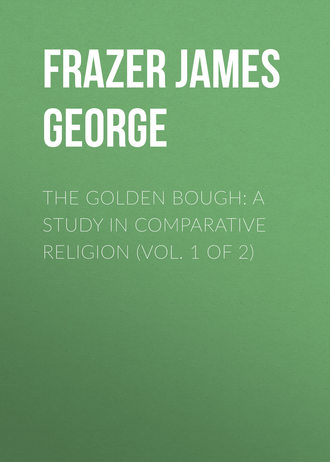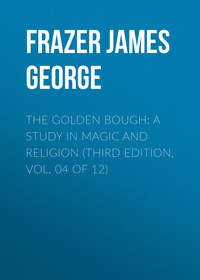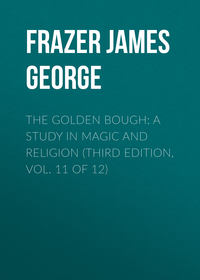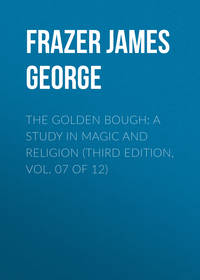 полная версия
полная версияThe Golden Bough: A Study in Comparative Religion (Vol. 1 of 2)
As with shadows and reflections, so with portraits; they are often believed to contain the soul of the person portrayed. People who hold this belief are naturally loth to have their likenesses taken; for if the portrait is the soul, or at least a vital part of the person portrayed, whoever possesses the portrait will be able to exercise a fatal influence over the original of it. Thus the Canelos Indians of South America think that their soul is carried away in their picture. Two of them having been photographed were so alarmed that they came back next day on purpose to ask if it were really true that their souls had been taken away.488 When Mr. Joseph Thomson tried to photograph some of the Wa-teita in Eastern Africa, they imagined that he was a magician trying to get possession of their souls, and that if he got their likenesses they themselves would be entirely at his mercy.489 An Indian, whose portrait the Prince of Wied wished to get, refused to let himself be drawn, because he believed it would cause his death.490 The Mandans also thought that they would soon die if their portrait was in the hands of another; they wished at least to have the artist's picture as a kind of antidote or guarantee.491 The same belief still lingers in various parts of Europe. Some old women in the Greek island of Carpathus were very angry a few years ago at having their likenesses drawn, thinking that in consequence they would pine and die.492 Some people in Russia object to having their silhouettes taken, fearing that if this is done they will die before the year is out.493 There are persons in the West of Scotland “who refuse to have their likeness taken lest it prove unlucky; and give as instances the cases of several of their friends who never had a day's health after being photographed.”494
§ 3. – Royal and priestly taboos (continued)
So much for the primitive conceptions of the soul and the dangers to which it is exposed. These conceptions are not limited to one people or country; with variations of detail they are found all over the world, and survive, as we have seen, in modern Europe. Beliefs so deep-seated and so widespread must necessarily have contributed to shape the mould in which the early kingship was cast. For if every individual was at such pains to save his own soul from the perils which threatened it from so many sides, how much more carefully must he have been guarded upon whose life hung the welfare and even the existence of the whole people, and whom therefore it was the common interest of all to preserve? Therefore we should expect to find the king's life protected by a system of precautions or safeguards still more numerous and minute than those which in primitive society every man adopts for the safety of his own soul. Now in point of fact the life of the early kings is regulated, as we have seen and shall see more fully presently, by a very exact code of rules. May we not then conjecture that these rules are the very safeguards which on à priori grounds we expect to find adopted for the protection of the king's life? An examination of the rules themselves confirms this conjecture. For from this it appears that some of the rules observed by the kings are identical with those observed by private persons out of regard for the safety of their souls; and even of those which seem peculiar to the king, many, if not all, are most readily explained on the hypothesis that they are nothing but safeguards or lifeguards of the king. I will now enumerate some of these royal rules or taboos, offering on each of them such comments and explanations as may serve to set the original intention of the rule in its proper light.
As the object of the royal taboos is to isolate the king from all sources of danger, their general effect is to compel him to live in a state of seclusion, more or less complete, according to the number and stringency of the taboos he observes. Now of all sources of danger none are more dreaded by the savage than magic and witchcraft, and he suspects all strangers of practising these black arts. To guard against the baneful influence exerted voluntarily or involuntarily by strangers is therefore an elementary dictate of savage prudence. Hence before strangers are allowed to enter a district, or at least before they are permitted to mingle freely with the people of the district, certain ceremonies are often performed by the natives of the country for the purpose of disarming the strangers of their magical powers, of counteracting the baneful influence which is believed to emanate from them, or of disinfecting, so to speak, the tainted atmosphere by which they are supposed to be surrounded. Thus in the island of Nanumea (South Pacific) strangers from ships or from other islands were not allowed to communicate with the people until they all, or a few as representatives of the rest, had been taken to each of the four temples in the island, and prayers offered that the god would avert any disease or treachery which these strangers might have brought with them. Meat offerings were also laid upon the altars, accompanied by songs and dances in honour of the god. While these ceremonies were going on, all the people except the priests and their attendants kept out of sight.495 On returning from an attempted ascent of the great African mountain Kilimanjaro, which is believed by the neighbouring tribes to be tenanted by dangerous demons, Mr. New and his party, as soon as they reached the border of the inhabited country, were disenchanted by the inhabitants, being sprinkled with “a professionally prepared liquor, supposed to possess the potency of neutralising evil influences, and removing the spell of wicked spirits.”496 In the interior of Yoruba (West Africa) the sentinels at the gates of towns often oblige European travellers to wait till nightfall before they admit them, the fear being that if the strangers were admitted by day the devils would enter behind them.497 Amongst the Ot Danoms of Borneo it is the custom that strangers entering the territory should pay to the natives a certain sum, which is spent in the sacrifice of animals (buffaloes or pigs) to the spirits of the land and water, in order to reconcile them to the presence of the strangers, and to induce them not to withdraw their favour from the people of the land, but to bless the rice-harvest, etc.498 The men of a certain district in Borneo, fearing to look upon a European traveller lest he should make them ill, warned their wives and children not to go near him. These who could not restrain their curiosity killed fowls to appease the evil spirits and smeared themselves with the blood.499 In Laos before a stranger can be accorded hospitality the master of the house must offer sacrifice to the ancestral spirits; otherwise the spirits would be offended and would send disease on the inmates.500 In the Mentawej Islands when a stranger enters a house where there are children, the father or other member of the family takes the ornament which the children wear in their hair and hands it to the stranger, who holds it in his hands for a while and then gives it back to him. This is thought to protect the children from the evil effect which the sight of a stranger might have upon them.501 At Shepherd's Isle Captain Moresby had to be disenchanted before he was allowed to land his boat's crew. When he leaped ashore a devil-man seized his right hand and waved a bunch of palm leaves over the captain's head. Then “he placed the leaves in my left hand, putting a small green twig into his mouth, still holding me fast, and then, as if with great effort, drew the twig from his mouth – this was extracting the evil spirit – after which he blew violently, as if to speed it away. I now held a twig between my teeth, and he went through the same process.” Then the two raced round a couple of sticks fixed in the ground and bent to an angle at the top, which had leaves tied to it. After some more ceremonies the devil-man concluded by leaping to the level of Captain Moresby's shoulders (his hands resting on the captain's shoulders) several times, “as if to show that he had conquered the devil, and was now trampling him into the earth.”502 North American Indians “have an idea that strangers, particularly white strangers, are ofttimes accompanied by evil spirits. Of these they have great dread, as creating and delighting in mischief. One of the duties of the medicine chief is to exorcise these spirits. I have sometimes ridden into or through a camp where I was unknown or unexpected, to be confronted by a tall, half-naked savage, standing in the middle of the circle of lodges, and yelling in a sing-song, nasal tone, a string of unintelligible words.”503 When Crevaux was travelling in South America he entered a village of the Apalai Indians. A few moments after his arrival some of the Indians brought him a number of large black ants, of a species whose bite is painful, fastened on palm leaves. Then all the people of the village, without distinction of age or sex, presented themselves to him, and he had to sting them all with the ants on their faces, thighs, etc. Sometimes when he applied the ants too tenderly they called out “More! more!” and were not satisfied till their skin was thickly studded with tiny swellings like what might have been produced by whipping them with nettles.504 The object of this ceremony is made plain by the custom observed in Amboina and Uliase of sprinkling sick people with pungent spices, such as ginger and cloves, chewed fine, in order by the prickling sensation to drive away the demon of disease which may be clinging to their persons.505 With a similar intention some of the natives of Borneo and Celebes sprinkle rice upon the head or body of a person supposed to be infested by dangerous spirits; a fowl is then brought, which, by picking up the rice from the person's head or body, removes along with it the spirit or ghost which is clinging like a burr to his skin. This is done, for example, to persons who have attended a funeral, and who may therefore be supposed to be infested by the ghost of the deceased.506 Similarly Basutos, who have carried a corpse to the grave, have their hands scratched with a knife from the tip of the thumb to the tip of the forefinger, and magic stuff is rubbed into the wound,507 for the purpose, no doubt, of removing the ghost which may be adhering to their skin. The people of Nias carefully scrub and scour the weapons and clothes which they buy, in order to efface all connection between the things and the persons from whom they bought them.508 It is probable that the same dread of strangers, rather than any desire to do them honour, is the motive of certain ceremonies which are sometimes observed at their reception, but of which the intention is not directly stated. In Afghanistan and in some parts of Persia the traveller, before he enters a village, is frequently received with a sacrifice of animal life or food, or of fire and incense. The recent Afghan Boundary Mission, in passing by villages in Afghanistan, was often met with fire and incense.509 Sometimes a tray of lighted embers is thrown under the hoofs of the traveller's horse, with the words, “You are welcome.”510 On entering a village in Central Africa Emin Pasha was received with the sacrifice of two goats; their blood was sprinkled on the path and the chief stepped over the blood to greet Emin.511 Amongst the Eskimos of Cumberland Inlet, when a stranger arrives at an encampment, the sorcerer goes out to meet him. The stranger folds his arms and inclines his head to one side, so as to expose his cheek, upon which the sorcerer deals a terrible blow, sometimes felling him to the ground. Next the sorcerer in his turn presents his cheek and receives a buffet from the stranger. Then they kiss each other, the ceremony is over, and the stranger is hospitably received by all.512 Sometimes the dread of strangers and their magic is too great to allow of their reception on any terms. Thus when Speke arrived at a certain village the natives shut their doors against him, “because they had never before seen a white man nor the tin boxes that the men were carrying: ‘Who knows,’ they said, ‘but that these very boxes are the plundering Watuta transformed and come to kill us? You cannot be admitted.’ No persuasion could avail with them, and the party had to proceed to the next village.”513
The fear thus entertained of alien visitors is often mutual. Entering a strange land, the savage feels that he is treading enchanted ground, and he takes steps to guard against the demons that haunt it and the magical arts of its inhabitants. Thus on going to a strange land the Maoris performed certain ceremonies to make it noa (common), lest it might have been previously tapu (sacred).514 When Baron Miklucho-Maclay was approaching a village on the Maclay Coast of New Guinea, one of the natives who accompanied him broke a branch from a tree and going aside whispered to it for a while; then going up to each member of the party, one after another, he spat something upon his back and gave him some blows with the branch. Lastly, he went into the forest and buried the branch under withered leaves in the thickest part of the jungle. This ceremony was believed to protect the party against all treachery and danger in the village they were approaching.515 The idea probably was that the malignant influences were drawn off from the persons into the branch and buried with it in the depths of the forest. In Australia, when a strange tribe has been invited into a district and is approaching the encampment of the tribe which owns the land, “the strangers carry lighted bark or burning sticks in their hands, for the purpose, they say, of clearing and purifying the air.”516 So when two Greek armies were advancing to the onset, sacred men used to march in front of each, bearing lighted torches, which they flung into the space between the hosts and then retired unmolested.517
Again, it is thought that a man who has been on a journey may have contracted some magic evil from the strangers with whom he has been brought into contact. Hence on returning home, before he is readmitted to the society of his tribe and friends, he has to undergo certain purificatory ceremonies. Thus the Bechuanas “cleanse or purify themselves after journeys by shaving their heads, etc., lest they should have contracted from strangers some evil by witchcraft or sorcery.”518 In some parts of Western Africa when a man returns home after a long absence, before he is allowed to visit his wife, he must wash his person with a particular fluid, and receive from the sorcerer a certain mark on his forehead, in order to counteract any magic spell which a stranger woman may have cast on him in his absence, and which might be communicated through him to the women of his village.519 Two Hindoo ambassadors, who had been sent to England by a native prince and had returned to India, were considered to have so polluted themselves by contact with strangers that nothing but being born again could restore them to purity. “For the purpose of regeneration it is directed to make an image of pure gold of the female power of nature, in the shape either of a woman or of a cow. In this statue the person to be regenerated is enclosed, and dragged through the usual channel. As a statue of pure gold and of proper dimensions would be too expensive, it is sufficient to make an image of the sacred Yoni, through which the person to be regenerated is to pass.” Such an image of pure gold was made at the prince's command, and his ambassadors were born again by being dragged through it.520 When Damaras return home after a long absence, they are given a small portion of the fat of particular animals which is supposed to possess certain virtues.521 In some of the Moluccas, when a brother or young blood-relation returns from a long journey, a young girl awaits him at the door with a caladi leaf in her hand and water in the leaf. She throws the water over his face and bids him welcome.522 The natives of Savage Island (South Pacific) invariably killed, not only all strangers in distress who were drifted to their shores, but also any of their own people who had gone away in a ship and returned home. This was done out of dread of disease. Long after they began to venture out to ships they would not immediately use the things they obtained from them, but hung them up in quarantine for weeks in the bush.523
When precautions like these are taken on behalf of the people in general against the malignant influence supposed to be exercised by strangers, we shall not be surprised to find that special measures are adopted to protect the king from the same insidious danger. In the middle ages the envoys who visited a Tartar Khan were obliged to pass between two fires before they were admitted to his presence, and the gifts they brought were also carried between the fires. The reason assigned for the custom was that the fire purged away any magic influence which the strangers might mean to exercise over the Khan.524 When subject chiefs come with their retinues to visit Kalamba (the most powerful chief of the Bashilange in the Congo Basin) for the first time or after being rebellious, they have to bathe, men and women together, in two brooks on two successive days, passing the nights in the open air in the market-place. After the second bath they proceed, entirely naked, to the house of Kalamba, who makes a long white mark on the breast and forehead of each of them. Then they return to the market-place and dress, after which they undergo the pepper ordeal. Pepper is dropped into the eyes of each of them, and while this is being done the sufferer has to make a confession of all his sins, to answer all questions that may be put to him, and to take certain vows. This ends the ceremony, and the strangers are now free to take up their quarters in the town for as long as they choose to remain.525 At Kilema, in Eastern Africa, when a stranger arrives, a medicine is made out of a certain plant or a tree fetched from a distance, mixed with the blood of a sheep or goat. With this mixture the stranger is besmeared or besprinkled before he is admitted to the presence of the king.526 The King of Monomotapa (South-East Africa) might not wear any foreign stuffs for fear of their being poisoned.527 The King of Kakongo (West Africa) might not possess or even touch European goods, except metals, arms, and articles made of wood and ivory. Persons wearing foreign stuffs were very careful to keep at a distance from his person, lest they should touch him.528 The King of Loango might not look upon the house of a white man.529
In the opinion of savages the acts of eating and drinking are attended with special danger; for at these times the soul may escape from the mouth, or be extracted by the magic arts of an enemy present. Precautions are therefore taken to guard against these dangers. Thus of the Battas of Sumatra it is said that “since the soul can leave the body, they always take care to prevent their soul from straying on occasions when they have most need of it. But it is only possible to prevent the soul from straying when one is in the house. At feasts one may find the whole house shut up, in order that the soul (tondi) may stay and enjoy the good things set before it.”530 In Fiji persons who suspected others of plotting against them avoided eating in their presence, or were careful to leave no fragment of food behind.531 The Zafimanelo in Madagascar lock their doors when they eat, and hardly any one ever sees them eating.532 The Warua will not allow any one to see them eating and drinking, being doubly particular that no person of the opposite sex shall see them doing so. “I had to pay a man to let me see him drink; I could not make a man let a woman see him drink.” When offered a drink of pombe they often ask that a cloth may be held up to hide them whilst drinking. Further, each man and woman must cook for themselves; each person must have his own fire.533 If these are the ordinary precautions taken by common people, the precautions taken by kings are extraordinary. The King of Loango may not be seen eating or drinking by man or beast under pain of death. A favourite dog having broken into the room where the king was dining, the king ordered it to be killed on the spot. Once the king's own son, a boy of twelve years old, inadvertently saw the king drink. Immediately the king ordered him to be finely apparelled and feasted, after which he commanded him to be cut in quarters, and carried about the city with a proclamation that he had seen the king drink. “When the king has a mind to drink, he has a cup of wine brought; he that brings it has a bell in his hand, and as soon as he has delivered the cup to the king he turns his face from him and rings the bell, on which all present fall down with their faces to the ground, and continue so till the king has drank… His eating is much in the same style, for which he has a house on purpose, where his victuals are set upon a bensa or table: which he goes to and shuts the door; when he has done, he knocks and comes out. So that none ever see the king eat or drink. For it is believed that if any one should, the king shall immediately die.”534 The rules observed by the neighbouring King of Kakongo were similar; it was thought that the king would die if any of his subjects were to see him drink.535 It is a capital offence to see the King of Dahomey at his meals. When he drinks in public, as he does on extraordinary occasions, he hides himself behind a curtain, or handkerchiefs are held up round his head, and all the people throw themselves with their faces to the earth.536 Any one who saw the Muato Jamwo (a great potentate in the Congo Basin) eating or drinking would certainly be put to death.537 When the King of Tonga ate all the people turned their backs to him.538 In the palace of the Persian kings there were two dining-rooms opposite each other; in one of them the king dined, in the other his guests. He could see them through a curtain on the door, but they could not see him. Generally the king took his meals alone; but sometimes his wife or some of his sons dined with him.539
In these cases, however, the intention may perhaps be to hinder evil influences from entering the body rather than to prevent the escape of the soul. To the former rather than to the latter motive is to be ascribed the custom observed by some African sultans of veiling their faces. The Sultan of Darfur wraps up his face with a piece of white muslin, which goes round his head several times, covering his mouth and nose first, and then his forehead, so that only his eyes are visible. The same custom of veiling the face as a mark of sovereignty is said to be observed in other parts of Central Africa.540 The Sultan of Wadai always speaks from behind a curtain; no one sees his face except his intimates and a few favoured persons.541 Amongst the Touaregs of the Sahara all the men (but not the women) keep the lower part of their face, especially the mouth, veiled constantly; the veil is never put off, not even in eating or sleeping.542 In Samoa a man whose family god was the turtle might not eat a turtle, and if he helped a neighbour to cut up and cook one he had to wear a bandage tied over his mouth, lest an embryo turtle should slip down his throat, grow up, and be his death.543 In West Timor a speaker holds his right hand before his mouth in speaking lest a demon should enter his body, and lest the person with whom he converses should harm the speaker's soul by magic.544 In New South Wales for some time after his initiation into the tribal mysteries, a young blackfellow (whose soul at this time is in a critical state) must always cover his mouth with a rug when a woman is present.545 Popular expressions in the language of civilised peoples, such as to have one's heart in one's mouth, show how natural is the idea that the life or soul may escape by the mouth or nostrils.546
By an extension of the like precaution kings are sometimes forbidden ever to leave their palaces; or, if they are allowed to do so, their subjects are forbidden to see them abroad. We have seen that the priestly king at Shark Point, West Africa, may never quit his house or even his chair, in which he is obliged to sleep sitting.547 After his coronation the King of Loango is confined to his palace, which he may not leave.548 The King of Ibo (West Africa) “does not step out of his house into the town unless a human sacrifice is made to propitiate the gods: on this account he never goes out beyond the precincts of his premises.”549 The kings of Aethiopia were worshipped as gods, but were mostly kept shut up in their palaces.550 The kings of Sabaea (Sheba), the spice country of Arabia, were not allowed to go out of their palaces; if they did so, the mob stoned them to death.551 But at the top of the palace there was a window with a chain attached to it. If any man deemed he had suffered wrong, he pulled the chain, and the king perceived him and called him in and gave judgment.552 So to this day the kings of Corea, whose persons are sacred and receive “honours almost divine,” are shut up in their palace from the age of twelve or fifteen; and if a suitor wishes to obtain justice of the king he sometimes lights a great bonfire on a mountain facing the palace; the king sees the fire and informs himself of the case.553 The King of Tonquin was permitted to appear abroad twice or thrice a year for the performance of certain religious ceremonies; but the people were not allowed to look at him. The day before he came forth notice was given to all the inhabitants of the city and country to keep from the way the king was to go; the women were obliged to remain in their houses and durst not show themselves under pain of death, a penalty which was carried out on the spot if any one disobeyed the order, even through ignorance. Thus the king was invisible to all but his troops and the officers of his suite.554 In Mandalay a stout lattice-paling, six feet high and carefully kept in repair, lined every street in the walled city and all those in the suburbs through which the king was likely at any time to pass. Behind this paling, which stood two feet or so from the houses, all the people had to stay when the king or any of the queens went out. Any one who was caught outside it by the beadles after the procession had started was severely handled, and might think himself lucky if he got off with a beating. No one was supposed to look through the holes in the lattice-work, which were besides partly stopped up with flowering shrubs.555








